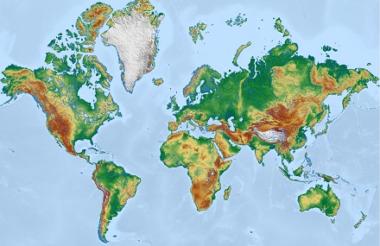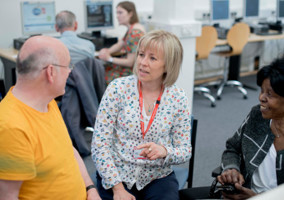This has been a tough year for all of us. Millions around the world have been affected by the enormous impacts of Covid-19. But the greatest challenges we face may yet be ahead of us.
Since the start of the pandemic, the British Red Cross has reached more than 1.5 million people in the UK. Yet we know there are many who have been left behind and will feel the effects of the crisis for years to come.
As the government sets out its new programme in next week’s Queen’s Speech, and ahead of the big global meetings of the G7 and COP26, this is the moment to work together to develop solutions to the big issues of our time.
That’s why today, together with Demos, we have published a new collection of essays, Communities of Humanitarian Thought: The Case for Change in a Time of Crisis.
As we find ourselves collectively at a moment of reflection, we must take this opportunity to ask – what is the case for change in the face of crisis? Are we set up in a way that effectively meets the needs of the most vulnerable? What do we need to do to recover and protect our communities against future shocks?
2020 exposed the cracks in the system and showed us what’s possible when we work together
At the British Red Cross, we have 150 years of experience responding to disasters, from large-scale major emergencies to personal crises. This is our core purpose. Yet the sheer scale of the Covid-19 response and the vast levels of unmet humanitarian need has been challenging for us all. The pandemic has revealed every strain in the system, its impact laying bare structural inequalities and flaws.
We need to reflect collectively, with compassion and kindness, on the truths exposed by the pandemic, and use what we’ve learned to inform future strategies for dealing with crises.
The experience of 2020 has galvanised our partnerships and sharing of ideas. We know that we can achieve much more when we work together.
As we launch our new Strategy 2030, which will transform how we help people in crisis, the British Red Cross is publishing this collection of essays to bring together a diverse range of perspectives from across disciplines, nations and the political spectrum.
Contributors including Nimco Ali, former health secretary Patricia Hewitt, Sir Iain Duncan Smith MP and Nisreen Elsaim capture the themes of a challenging year and put forward the solutions to some of the topics that are most relevant to the work that we do. These essays show that for all the challenges we currently face, we have an opportunity to work together and build back better.
We must do better for the most vulnerable in our society
Better and earlier support would have helped those who were disproportionately affected by this crisis because of health inequalities and financial insecurity.
Refugees and people seeking asylum faced unimaginable challenges during the pandemic. That so many contributed to the community responses in the areas they now call home shows precisely why we need fair and humane reform of immigration and asylum processes, and why we cannot treat anyone like second class citizens.
Connected communities are better able to cope with, and recover from, crises. Contingency plans must be put in place for people who live alone, have limited support networks or are at risk of abuse at home. During the pandemic we have also seen too many people lacking access to the internet or mobile technology, meaning they have struggled to stay in touch with others through periods of lockdown. We need to connect our communities up better in both our everyday and online worlds.
Many of society’s systems have found themselves wanting. We live with under-pressure health and social care systems designed to meet the needs of a different era, emergency response structures that all too often fail to meet the needs of those most vulnerable to risk, and a flawed and inefficient asylum system. But issues are not insurmountable.
Put people and communities at the heart of solutions
As well as exposing the major challenges we face, this year has also shone a light on our many strengths, and our thriving community spirit.
Voluntary agencies have played a huge role. The Red Cross has worked closely with charities to offer community-based responses, working with people on the ground who have local knowledge and expertise.
By working together we’re helping to create a safer world where we can be with our loved ones again, without fear of becoming sick.
We still need to do more. We must make sure no one is left behind. We can share our data-informed insight to help identify those most vulnerable to risk and work harder to ensure those delivering community-based support are as diverse as those communities themselves.
Disasters and emergencies, health inequalities and displacement and migration are increasingly urgent humanitarian challenges facing the world.
We must shape the way we respond to the crises of tomorrow as we recover from the ones we face today.
Mike Adamson is chief executive of the British Red Cross.
Related articles
Mike Adamson: How the British Red Cross is facing up to racism
Mike Adamson, chief executive at the British Red Cross, explains why the charity has launched an anti-racism programme and what it will be doing
Mike Adamson: ‘Why the British Red Cross needs to be thinking big and long-term’
British Red Cross chief executive Mike Adamson tells Kirsty Weakley about the charity's priorities for the next decade.
Mike Adamson: Strong, meaningful connections are important for community resilience but they require investment
Mike Adamson from the British Red Cross writes that building strong connections between charities and other organisations is an important part of building community resilience and cautions that that this requires investment of both time and money.












